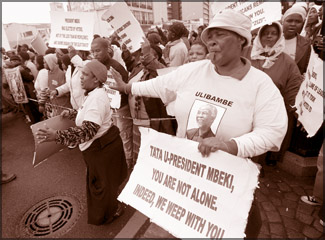South Africa ponders life after Mbeki
South Africa's political landscape is changing faster than anyone
anticipated.
The speed of events over the past few days has inevitably created an
atmosphere of uncertainty, and some apprehension.
The sudden resignation of President Thabo Mbeki has drawn a welter of
calls for clear and strong leadership, lest the country finds itself on
the path to becoming "a banana republic", to quote the words of
Archbishop Desmond Tutu.
|

Supporters of ousted South African President Thabo Mbeki,
show their support outside Parliament in Cape Town, South
Africa, Tuesday Sept 23, 2008. (AP Photo) |
However, change has been on the cards since the historic African
National Congress (ANC) national conference in Polokwane last December.
Thabo Mbeki, seeking a third term as party leader, was defeated by
his long-time rival, Jacob Zuma - the man whom Mr Mbeki had sacked as
South Africa's Deputy President in 2005.
Polokwane was a watershed, with 4,000 ANC delegates from branches all
over the countries exercising their democratic right to force a change
of leadership in the party.
After 10 years at the helm of the ruling party, Thabo Mbeki found
himself rejected in favour of the populist, Jacob Zuma.
Within days of the Polokwane conference, the writing was on the wall
for Thabo Mbeki and his allies.
At the ANC's anniversary celebrations in January, the then leader of
the party's Youth League, Fikile Mbalula, signalled that the Zuma camp
in the ANC was firmly in the ascendancy.
"We are the future. No-one can stop us", he declared.
There has been a decidedly mixed reaction in South Africa to the
forced resignation of Thabo Mbeki.
"He was a bad president. He divided our country", said last week's
Sunday Times. But many commentators and observers have expressed
disquiet at the timing of this political change.
They believe it could leave South Africa vulnerable at a time of
turbulence in the world economy.
An analysis by Standard Chartered Bank says that "with the economic
slowdown and electricity crisis, South Africa already faces a trying
time".
"Emigration levels from the country are the highest they have been
since the early 1990's.
Both business and consumer confidence have slumped," it continues.
"While investors may welcome greater certainty in terms of the future
political outlook, a more volatile political transition is likely to
cost the country dearly," the bank says.
It was Thabo Mbeki's stewardship of the South African economy that
has arguably been his greatest achievement.
During his presidency, the country has enjoyed its longest period of
steady economic growth.
There are fears that if Jacob Zuma becomes President after next
year's elections, he may be beholden to some of his allies on the
political left, such as the Cosatu trade union federation and the South
African Communist Party.
They have always been opposed to Mr Mbeki's economic policies,
arguing that the poor have been marginalised, and that unemployment
remains high.
However, in the short term, there are hopes that the likely acting
president, Kgalema Motlanthe, may be the safe pair of hands that the
country needs at present.
"Mr Motlanthe has been one of the few voices of reason in the ANC,"
said Patricia De Lille, the leader of the smaller opposition party, the
Independent Democrats.
"We hope he will put the country before the party, and put the lives
of ordinary South Africans ahead of party political agendas," she said.
Helen Zille, the leader of the biggest opposition party, the
Democratic Alliance, says the current political crisis has highlighted
the deep divisions within the ANC.
"President Mbeki's ousting may prove to be the undoing of the ANC's
electoral dominance."
The ANC has been stressing the need for a smooth transition.
The confirmed resignation of six cabinet ministers on Tuesday was not
the type of news it wanted.
Another eight ministers or deputy ministers have been persuaded to
stay, and will, it seems, be re-appointed by the new administration.
-BBC
|
